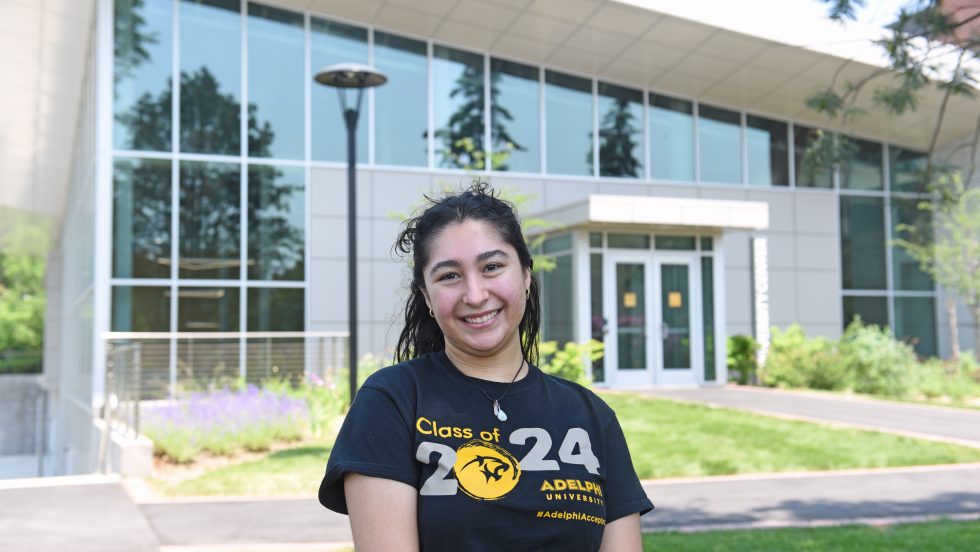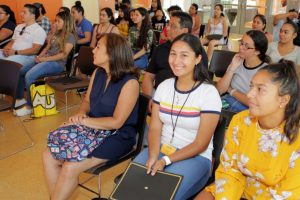
Now in its third year, our Hispanic Community Partnership Program has more than tripled in attendance and is drawing interest from Hispanic teens as far away as California. The program is just one part of our commitment to student success and access to education, and a significant stepping-stone toward our goal to be a Hispanic-Serving Institution.
This observation, from Jolie Correa, now a rising sophomore majoring in nursing, sums up the mission of Adelphi’s Hispanic Community Partnership Program. The program is designed to help Hispanic high schoolers successfully transition to college—expanding access to higher education and opening doors they may have thought were closed to them. Beginning with just 19 students in year one, interest has grown. This summer, the goal is to welcome 50 Hispanic students of the 81 nominations received, from as far away as California.
Success in college often depends on the skills that first-year students bring to campus. And many high school students, especially those from underserved communities, may lack guidance on filling out a college application, writing an essay or understanding the costs of college. The Hispanic Community Partnership Program plays an important role on all these critical fronts.
Students in the program meet with a peer adviser, learn time management and essay writing skills, and take a crash course in overcoming adversity. A seminar in financial literacy helps them understand what is ahead and how they can manage college expenses. And they learn how to find a mentor to help them manage the challenges of college life.
“We want students to see what college is like and give them the skills and confidence they need to get a college degree,” said Chotsani Williams West, MA ’07, executive director of diversity, equity and inclusion at Adelphi.
Focus on First-Generation College Students

Jolie Correa
Many of the students in the program are first-generation college students. Studies show that first-generation college students face challenges that make them less likely to graduate than the children of college-educated parents. A third of first-generation students drop out of college at the three-year mark, compared with a quarter of students whose parents have degrees, according to the National Center for Education Statistics.
West says a key difference in the two groups is that the children of college-educated parents know how to get advice and support. First-generation kids often do not. “There’s literature out there showing that first-generation students may not be comfortable asking for help,” West said, mentioning research by Lisa Minicozzi, EdD, a clinical associate professor of education and program director for educational leadership at Adelphi. “Just navigating the offices on campus can be a big hurdle for them.” The first-generation students, independent to a fault, try to get it done alone.
Students who are not first generation, West says, tend to seek out support in the very beginning, even if it’s just from a parent who understands how college works. “That gives one a competitive edge, when you have someone to bounce ideas off of, someone to connect with,” she said.
The Hispanic Community Partnership Program stresses the importance of finding a mentor quickly after arriving on campus and of building a community of peers. “We share the mentoring culture we have and what it means to connect and successfully have that relationship from day one,” West said.
So far, the program has a good success rate. Seventeen students from the first two programs were accepted to Adelphi. Two have enrolled, and each received a $1,000 Adelphi Advantage Award.
Jolie Correa, who is quoted above, attended the first session in 2019 and just completed her first year at the University. She said that, when she was considering colleges, she liked the fact that Adelphi makes diversity a priority. She also appreciated a school that focused on her needs as a Hispanic student. “I feel like the Hispanic community is easily forgotten about. The program gave us support, and Adelphi continues to support me.”
More Hispanic Students in College
As the Hispanic population in the United States has increased, so has the number of Hispanic students pursuing higher education. Between 2000 and 2015, the college attendance rate among Hispanic high school graduates grew from 22 percent to 37 percent, according to the U.S. Department of Education. Hispanic undergrad enrollment more than doubled and graduation rates are rising. Currently, about 18 percent of Adelphi’s students are of Hispanic backgrounds. If that rises to 25 percent, Adelphi would be designated as a Hispanic-Serving Institution (HSI) by the Hispanic Association of Colleges and Universities, making Adelphi eligible for increased academic offerings, support and opportunities for Hispanic students.
West stresses that Adelphi’s commitment to helping Hispanic students achieve academic success doesn’t stop with getting them enrolled. “We also focus on retention and success rates, all the way through. We give students the support and guidance they need to graduate.”
The Hispanic Community Partnership Program is just one of many diversity initiatives offered at Adelphi. Task forces for LGBTQ+ students, student veterans and international students ensure that all members of the Adelphi community feel included and engaged on campus. And the Diversity Certificate Program trains faculty and staff to promote a respectful learning environment. That program has been so successful that it has been adopted by several local high school districts.